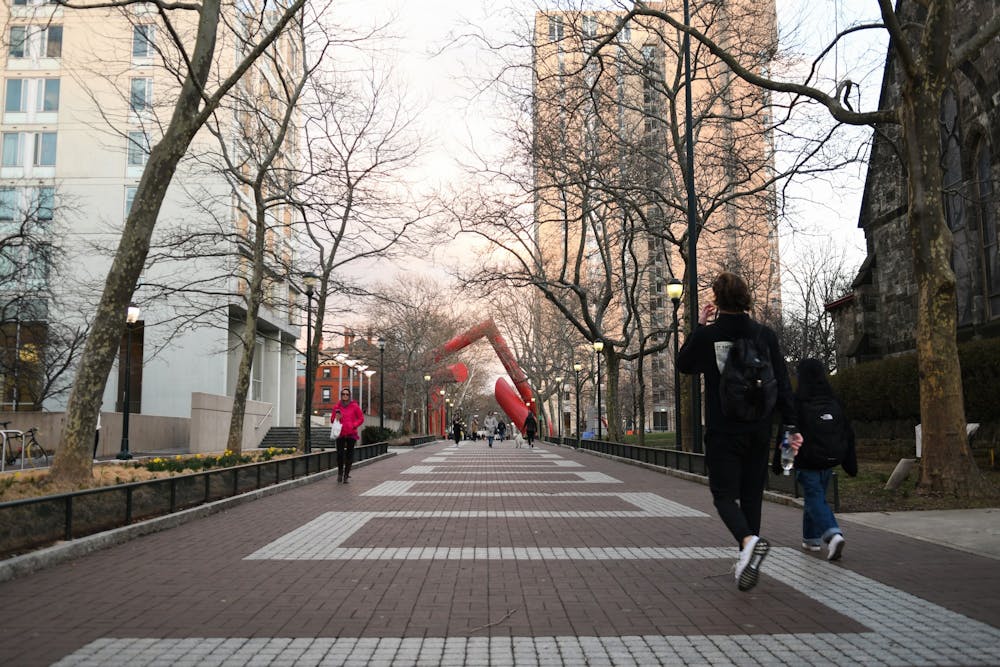
Penn and 16 other universities were sued in January 2022 for allegedly collaborating to reduce financial aid and artificially increase tuition costs.
Credit: Adam BennettOver one year after Penn and 16 other universities were sued for allegedly colluding to reduce financial aid, two Penn alumni and attorneys spoke to The Daily Pennsylvanian about the current status of the lawsuit.
Penn and the other universities – including five Ivy League schools – were first sued in January 2022 for allegedly collaborating on financial aid calculations to artificially increase tuition costs, shortchanging over 170,000 students out of the financial aid packages that they should have received. On Aug. 15, a District Court denied a motion filed by the schools that were sued to dismiss the lawsuit, according to a public opinion.
In the opinion, Judge Matthew Kennelly said that there was evidence that the schools favor the children of wealthy past or potential donors. Kennelly also said there was evidence that they admit waitlisted and transfer students on a need-aware basis.
A Penn spokesperson wrote to the DP that the University does not usually comment on litigation.
After it rejected the schools' motion to dismiss, the court issued a case management order, which stated that the discovery process by which the plaintiffs and defendants in the case exchange requested information will continue until January 2024, when expert witness reports will be submitted.
In 2025, the court will hold what is called a class certification hearing, where the plaintiffs must prove that common issues are shared among the individual cases for each school. The last step before a trial – the summary judgment – is also planned to occur in 2025. If there is any material that is disputed based on facts, the lawsuit will go to a trial, and the judge may decide to end it by declaring victory for the plaintiffs or defense.
Since the middle of the 19th century, Ivy League schools and the Massachusetts Institute of Technology have compared financial aid packages for students admitted to multiple schools and fixed the packages for every student receiving aid. The schools said that the price-fixing ensured they would have enough money to give every admitted student a full need-based allotment.
In 1994, after an MIT settlement, Congress granted all schools through Section 568 of the Higher Education Act the right to agree on a financial aid formula with other schools, as long as those schools all used need-blind admissions and granted full demonstrated aid to every student.
The Section 568 antitrust exemption expired in September 2022, meaning these 17 schools – including Penn – are currently not legally protected to collude on financial aid policies.
1972 Wharton graduate Robert Litan said that the Ivy League’s history of a lack of financial aid competition predicted the lawsuit in a July 2021 article. He said that universities would either have to extend Section 568 after it expired or risk being sued. He also said that they should “embrace competition” by supplementing need-based aid with merit and athletic scholarships.
In August 2021, Litan and Alan Cotler, another 1972 Wharton graduate, sent a letter about their views on need-based financial aid to the presidents of all Ivy League schools, according to the Philadelphia Inquirer. Litan and Cotler presented an argument that the Ivy League’s lack of athletic scholarships would be a similar denial of benefits once the 568 exemption expired in response to the NCAA v. Alston ruling.
According to Class of 1972 president Jeffrey Rothbard, Litan and Cotler only received a response to their letter from the president of Yale University. In response, Rothbard said he sent a copy of the letter to former Penn President Amy Gutmann asking her to participate in a university-wide discussion about the 568 exemption. However, Rothbard said that Gutmann did not respond to his request.
Rothbard then sent a letter to University Chaplain Charles Howard, who allegedly said that the issue was not under his jurisdiction. Rothbard said his frustration grew, and he then tried to engage all the class presidents in conversation.
“I’m not the troublemaker type in the slightest,” Rothbard said. “If anything, I bleed red and blue, and I couldn’t believe the way I was being treated.”
Howard declined to comment.
After trying to engage the class presidents, Rothbard said he was reprimanded by the Office of Alumni Relations. Associate Vice President of Alumni Relations Hoopes Wampler allegedly took away access to many of Rothbard’s privileges, including his PennKey. Rothbard said he called the head of the Alumni Leadership Council, and his access was immediately restored.
Wampler did not respond to a request for comment.
Rothbard added that he was slated to meet President Liz Magill at a Feb. 10 alumni event and planned to initiate a conversation about the issue there. However, the event was interrupted by a protest in support of the UC Townhomes residents. Rothbard plans to introduce himself to Magill and follow up in the future.
The Daily Pennsylvanian is an independent, student-run newspaper. Please consider making a donation to support the coverage that shapes the University. Your generosity ensures a future of strong journalism at Penn.
Donate







